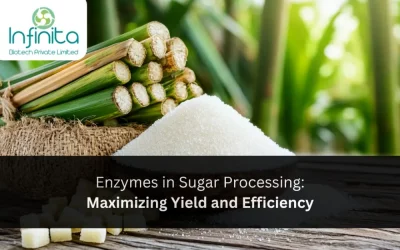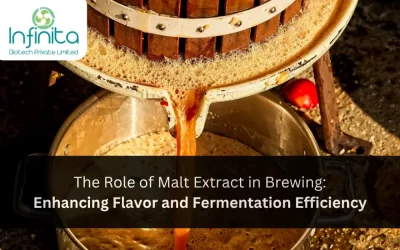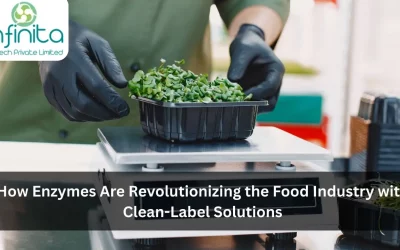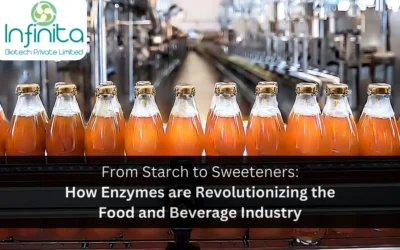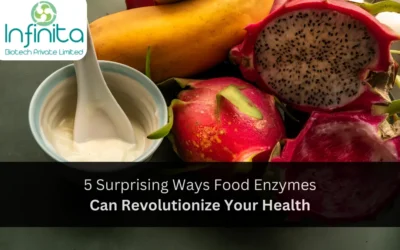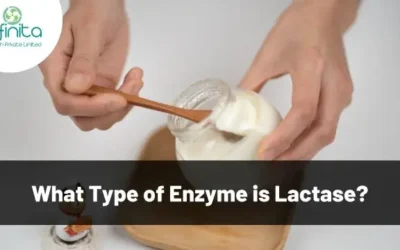In layman’s terms, a pectinase enzyme is a group of enzymes that are further used to break down the plant cell walls made of pectin. Now, pectin is found in the middle lamella of the cell walls of a plant. It is an acidic heteropolysaccharide. Pectin is found in other forms as well, namely, protopectin, peptic acid, and pectinic acid. These forms of pectin are present in different plant tissues. Coming back to pectinase, it breaks down the pectin polymer into galacturonic acid and monomer acids.
The uses of pectinase is very diverse in various industries. For instance, they are used in the fruit juice industry, wine industry, food products industry, coffee and instant tea industry. When pectinase is in its alkaline form, it is also used in the paper and pulp industry. On a commercial scale, pectinase is also used as a poultry enzyme.
Pectinase: Overview of the microbial enzyme
Enzymes are basically proteins that act as a catalyst during various reactions. Pectinase is a group of enzymes that breaks down the pectin polymer into sugar monomers. This group has various uses across multiple industries. Pectinase can be classified into three categories based on its mode of action on substrate: –
- Polygalacturonase – breaks down pectin into smaller fragments through the process of hydrolysis.
- Pectinesterase – breaks down the polymer of pectin into monomers through the reactionary process of trans-elimination.
- Pectin lyase – this form of pectinase breaks down pectin through the reactionary process of de-esterification.
Polygalacturonase (PG) and polymethyl galacturonase (PMG) are two enzymes that act on α 1→4 glycosidic bonds of polygalacturonic acid and hydrolytic cleavage, respectively.
Moreover, Pectinase can be easily found in fruits. It acts as a natural catalyst and plays a role in fruit ripening. Pectinase is also found in microorganisms, and this pectinase is used in large scale industries. Now, because microbes have the tendency to multiply themselves, industries produce pectinase through microbes in a controlled process.
Different types of fungus, yeast and bacteria strains are used to produce pectinase. Pectinase produced by plants has higher activity and is thus more tolerant to alkali, acid and high temperatures. On the other hand, microbes’ produced pectinase has low activity and is less tolerant to high temperatures, acid and alkali. This is the reason why industries prefer to recombine several microbes to produce pectinase with higher activity. It produces pectinase with higher pH tolerance and temperature ranges.
Uses of Pectinase in different industries
Pectinase is characterised by de-esterification and depolymerisation reactions. Pectinase has multiple uses and is widely accepted as a sustainable enzyme. For instance, in the feed industry, pectinase is treated to increase bio-accessibility and improve digestion and nutrition in animals.
There are also uses of pectinase in the textile industry. This enzyme is one of the main reasons behind the unprecedented success of the textile industry. Further, pectinase is also used to extract fruit juices from several fruits, namely, apple, grape wine, grapes, raspberries, and strawberries. While fruit juice extraction, pectinase is also used to purify the juices.
Along with this, the pectinase enzyme is also used in the treatment of wastewater. The use of pectinase enzymes don’t end here. They play a vital role in textile processing and cotton bioscouring. Since the pectinase enzyme has the ability to break down pectin, it is also used in the process of making paper.
When pectinase is combined with lipases, hemicelluloses, amylases, and cellulases, it is also used as an alternative for caustic soda. Besides this, the pectinase enzyme is also used to ferment tea and coffee and used to extract oil. Lastly, uses of pectinase are also found in the food industry, and its usage is discussed in the later section.
How is pectinase enzyme produced?
Pectinase is a naturally occurring group of similar enzymes. It is present in the fruits of plants and promotes ripening. The other naturally occurring source of pectinase is microbes such as fungus, bacteria and yeast. For commercial purposes, microbes’ produced pectinase is used because it has lower activity and can be controlled by industries. There are various processes that an industry can use to produce pectinase: –
Solid-state fermentation
It is a process where pectinase is produced by promoting the growth on a solid surface in the absence of water. Some industries partially use water in solid-state fermentation. To extract the pectinase enzyme, a specific amount of buffer and water is added.
Submerged fermentation
Both solid-state fermentation and submerged fermentation can produce equally effective pectinase enzymes. In this process, industries use liquid broth to culture the organisms. Submerged fermentation releases a colossal amount of effluents.
Now that the enzyme is extracted through the process (submerged or solid-state fermentation), it is essential to purify the extracted enzyme to increase its effectiveness. There are many ways of purification that industries may use depending on their comfortability with the process. Purification can be completed through filtration, ethanol precipitation, ammonium sulphate precipitation, dialysis, or ion-exchange chromatography.
Uses of pectinase in the food industry
The uses of pectinase enzymes is widespread. As aforementioned, they are used in various industries, but the most prominent use is in the food industry. Even in the natural state, pectinase found in fruits speeds up the process of ripening. Pectinase enzyme is one of the best catalysts and has multiple uses in the food industry.
However, pectinase is not used as a single enzyme in the food industry. Instead, it is combined with amylase, like the alpha-amylase enzyme. This combination is used as a purifying agent. Both the food and wine industries use it in the processing of their products. The most extensive use of pectinase is in the processing of apple juice. After the production, apple juice often turns into a turbid plant matter. Using pectinase degrades the gums and helps in the production of clearer juice.
Apart from this, use of pectinase is also found to soften fruits and ferment coffee and tea.
If you are searching for eco-friendly enzymatic solutions, look no further than Infinita Biotech. We provide solutions for several industries ranging from Brewery, Starch, Wine, Malt, Wastewater Treatment, and Food to Animal Feed. Our extensive expertise in the industry will help every domain associated with us towards success.
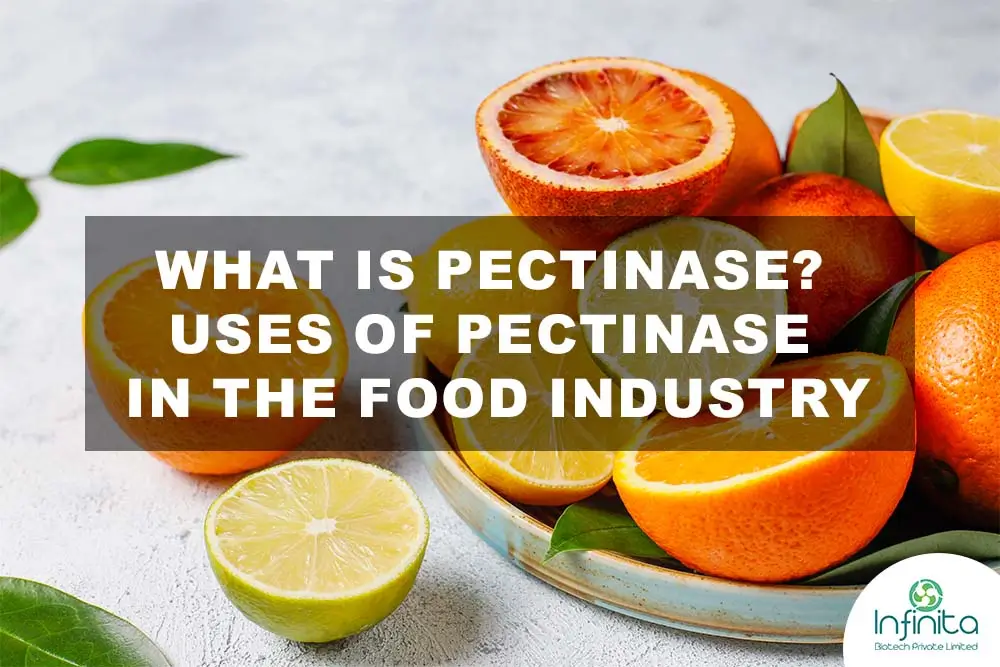
 Summarize this Article with AI
Summarize this Article with AI
